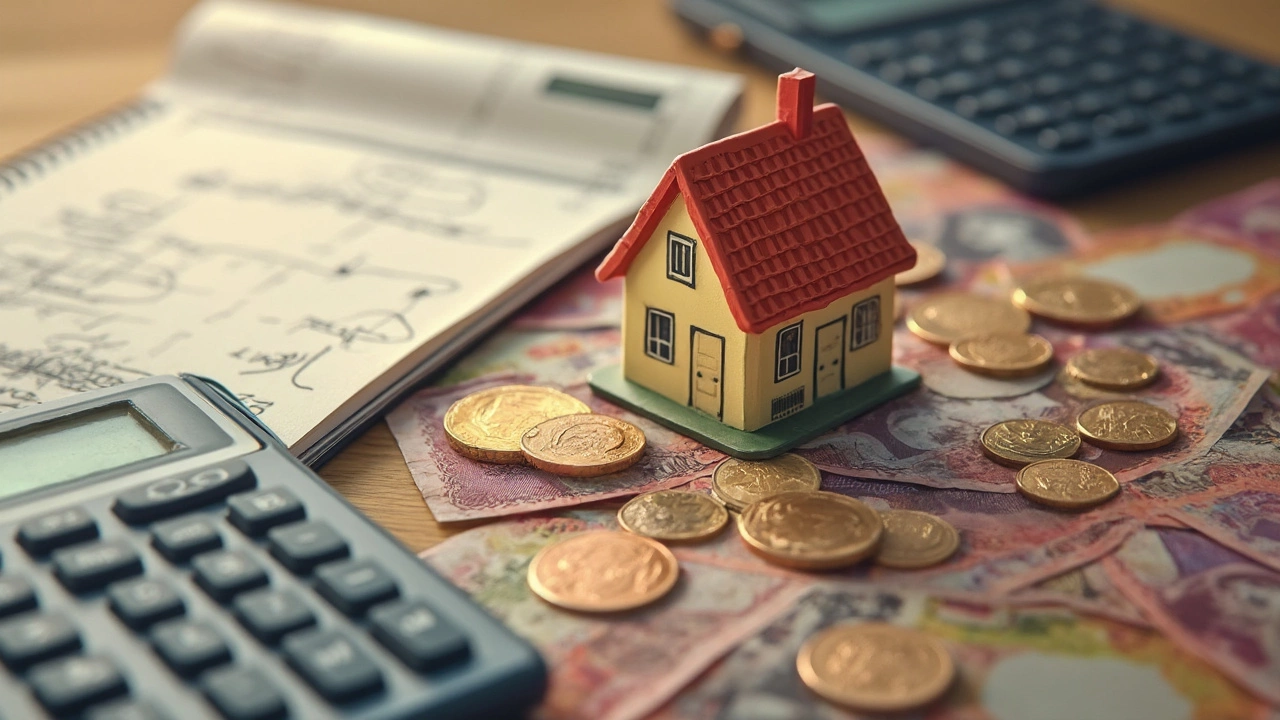So, you're thinking about buying your first home and wondering if $10,000 is enough for a down payment. Good question, and honestly, there’s no one-size-fits-all answer. Whether it’s enough depends on a few things, like where you're looking to buy and what kind of loan you’ve got your eyes on.
First up, let's understand what a down payment actually is—it's not just a random amount you throw at a house. For lots of people, this is usually a small chunk of the total cost, often between 5-20% of the home’s price. But don’t fret if you’re on the lower end! There are loans that could work in your favor if your budget is snug.
You've got to consider the housing market where you want to buy. In some places, home prices are lower, making that $10k more feasible. But in bigger cities where prices are through the roof, you might need to beef up your savings or look at smaller, more affordable homes.
- Understanding Down Payments
- Evaluating Market Conditions
- Exploring Loan Options
- Navigating Closing Costs and Additional Expenses
- Tips for First-Time Buyers
Understanding Down Payments
If you're in the exciting but sometimes nerve-wracking journey of buying a home, wrapping your head around down payments is a must. Simply put, the down payment is the upfront chunk of money you pay when buying a home. It's not just a random amount; it sets the tone for your mortgage and affects how much you'll pay over the life of the loan.
Here's the deal. For many loans, especially traditional ones, lenders generally expect you to put down 20% of the home's price. But don't let that scare you off. There are options out there. For instance, FHA loans are pretty popular among first-time homebuyers because they often require as little as 3.5% down. Then there are VA loans available for veterans, which sometimes require zero down payment!
According to the National Association of Realtors, "In today's competitive market, understanding the ins and outs of down payments can be crucial for success."
So, how do you figure out what's right for your situation? It starts with knowing your goals and your budget. If $10,000 is what you've got, consider homes within a range that lets you stay within a comfortable monthly payment once you factor in other costs like taxes and insurance.
It's also important to remember that more doesn't always mean better. While a higher down payment can reduce your monthly payment and even avoid private mortgage insurance (PMI), it also ties up some of your savings that you might need for fixes or emergencies later.
Keep in mind, lenders look at more than just your down payment. They’re also keen on your credit score, income stability, and whether you can comfortably handle additional housing expenses.
Here's a quick look at some common down payment options:
- Conventional Loan: Usually requires 5-20% down.
- FHA Loan: Requires as low as 3.5% down with credit flexibility.
- VA Loan: Available to military personnel and often needs no down payment.
- USDA Loan: Targeted at rural homebuyers with possible zero down payment.
Remember, knowledge is power. Getting familiar with your options gives you the best shot at finding the right home without stretching your budget too thin.
Evaluating Market Conditions
Diving into the real estate market might feel a bit like navigating a maze—full of twists, turns, and the occasional dead end. But understanding market conditions can totally be a game-changer, especially when you're eyeing a $10,000 down payment.
First thing to know: house prices are kind of like the weather—they can change rapidly depending on where you are. Smaller cities or rural areas? You might find sweet deals, where $10,000 stretches further. But shoot for the stars in places like San Francisco or New York, and you might just need a bigger bag of money.
It's all about supply and demand. If there's a high demand for houses where you're looking, prices might be jacked up. On the flip side, a buyer’s market—where more houses are up for grabs than there are buyers—means you could snag a deal. Keep your eyes peeled for these shifts.
Also, keep tabs on interest rates. When rates drop, folks get excited about mortgages—which can hike demand, pushing prices up. But higher rates? They might cool things off a bit, giving you more leverage on price negotiations.
| City | Average Home Price | Down Payment (10%) |
|---|---|---|
| Austin, TX | $450,000 | $45,000 |
| Cleveland, OH | $150,000 | $15,000 |
| Boulder, CO | $700,000 | $70,000 |
While cruising the market, look at local trends over the past five years. If prices have been shooting up, you might face a tight squeeze. But if there's been a dip, maybe it's time to pounce.
Round up some local realtors—they’re like treasure maps to hidden details about neighborhoods, pricing, and what might be a deal or a dud. And hey, check out online market reports to keep your finger on the pulse.
Remember, being informed means you’re armed to make smarter decisions, especially with limited resources like a $10,000 down payment. So, gear up and get out there!

Exploring Loan Options
Diving into the world of home loans can seem like entering a maze, but it’s not as tricky as it looks once you know your options. Surprisingly, there are several options that don't demand huge down payments and could fit perfectly with your $10,000 budget.
First, there's the classic FHA loan. These loans are backed by the government, and they’re a favorite among first-time buyers for a good reason. With an FHA loan, you might only need to put down as little as 3.5%. That's awesome if you're working with a tight budget because it makes owning a home feasible even when you don't have a mountain of cash handy.
Not into FHA? You might want to explore conventional loans through Fannie Mae or Freddie Mac, which can also be a decent choice. Some of these loans offer down payments as low as 3% depending on the circumstances. Just be aware that these often require a higher credit score than an FHA loan.
For our friends in the rural areas or small towns, a USDA loan could be your golden ticket. These loans can offer zero down payment options for eligible buyers. Yes, you heard right—zero! But, they do come with some location and income restrictions, so you’ll need to make sure you're eligible.
We can’t leave out VA loans, which are fantastic if you're a veteran or actively serving. These loans also allow for zero down payment and don't require private mortgage insurance (PMI), making home-buying quite straightforward for those serving in the armed forces.
| Loan Type | Minimum Down Payment | Benefits |
|---|---|---|
| FHA Loan | 3.5% | Lower credit requirements |
| Conventional Loan | 3% | Various term options |
| USDA Loan | 0% | For rural areas |
| VA Loan | 0% | No PMI for veterans |
When considering these loan options, remember to factor in all the costs, not just the down payment. Things like private mortgage insurance (PMI) and closing costs can sneak up on you. Make sure you read the fine print and get all your questions answered by a trusted lender. It's totally worth it to shop around for lenders, too, since rates and terms can vary quite a bit.
Navigating Closing Costs and Additional Expenses
Okay, so you’ve got your down payment sorted, but what about those pesky closing costs and other hidden expenses? These can sneak up on you if you're not prepared. Typically, closing costs can range from 2% to 5% of your home's purchase price. So, if you're eyeing a $200,000 house, that could mean an extra $4,000 to $10,000 out of pocket.
What exactly are these closing costs, you ask? They’re basically a mix of different fees that can include loan origination fees, appraisal fees, title insurance, and even home inspection charges. Handy tip: Always ask the lender for a Loan Estimate which breaks down these costs.
And there's more! Don’t forget about things like moving expenses, home insurance, and property taxes. Plus, if you're buying something that needs a bit of TLC, there might be immediate renovation costs. Creating a realistic budget for these expenses will save you from financial headaches later.
Here’s a quick list of what you might expect:
- Loan Origination Fee: This is what you pay the lender for processing the loan.
- Appraisal Fee: To confirm the property's market value.
- Title Insurance: Protects against problems with the title.
- Home Inspection: Crucial to ensure the house is in good condition.
- PMI (if applicable): Private Mortgage Insurance, if your down payment is less than 20%.
If you’re lucky, sometimes you can get the seller to cover part of your closing costs. It’s not a given, but in a buyer's market, there’s no harm in asking during negotiations.
If you're not too familiar with the world of real estate, consider consulting with a real estate agent. They’re in the know and can guide you through these extras, ensuring you're not caught off guard.

Tips for First-Time Buyers
Stepping into the world of home ownership for the first time can feel like diving into the deep end of a pool. But don't sweat it; armed with the right tips, you can tread water just fine. So, what should you do?
First, take a good look at your finances. It's not just about having $10,000 for the down payment. You need to think about extra costs like closing fees, moving expenses, and maybe even some minor repairs. First-time homebuyers often overlook these, but they add up fast!
Next up, educate yourself on the market. Google has your back here. Hunt down local real estate trends. Are prices going up, or are they cooling off? Knowing this can help you time your purchase right.
Let's talk loans. You don’t need a PhD to know your options, but getting a grasp on different loan types can save you big bucks. FHA loans are super popular because they let you put down as little as 3.5%. And if you’re a veteran, VA loans might mean zero down payment!
When you’re ready to start looking at houses, kick off your search with a list of must-haves and nice-to-haves. It’s easy to get swayed by fancy features, but sticking to your guns ensures you're buying the right place for you, not just the shiniest.
| Loan Type | Minimum Down Payment |
|---|---|
| FHA Loan | 3.5% |
| Conventional Loan | 5%-20% |
| VA Loan | 0% |
Finally, build a solid team. This includes a trustworthy real estate agent and maybe even a financial advisor, especially if you're feeling clueless about the money side of things. These folks are pros for a reason.
If you follow some of these tips, finding a home will be less about stress and more about securing that dream you’ve been itching for!


Corbin Fairweather
I am an expert in real estate focusing on property sales and rentals. I enjoy writing about the latest trends in the real estate market and sharing insights on how to make successful property investments. My passion lies in helping clients find their dream homes and navigating the complexities of real estate transactions. In my free time, I enjoy hiking and capturing the beauty of landscapes through photography.
view all postsWrite a comment